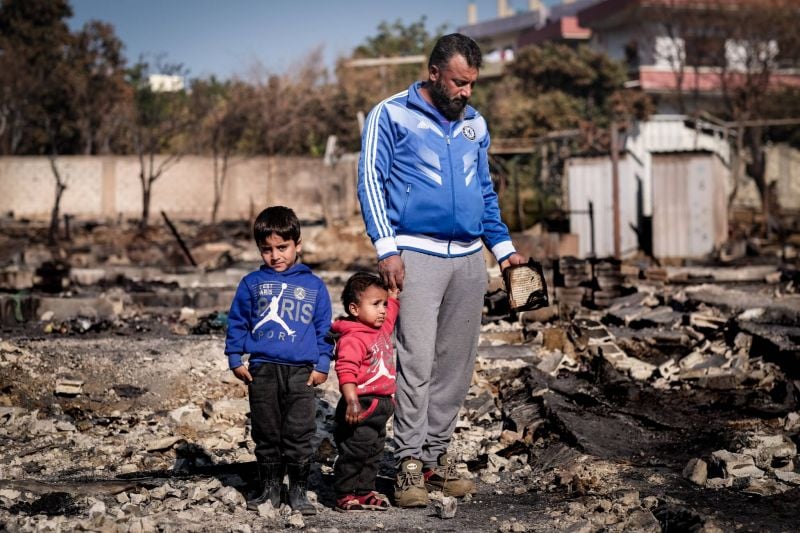
A Syrian refugee stands with his children on the rubble of their camp in Bhanin, which was torched last December. (Credit: João Sousa/L’Orient Today)
BEIRUT - President Michel Aoun asked European Commission Vice President Margaritis Schinas on Friday for his organization’s help in facilitating the return of Syrian refugees to “safe areas” in their country, the presidency tweeted.
Here’s what we know:
• Aoun complained that Lebanon could no longer handle “the burdens of continued Syrian displacement.” Schinas’ visit to Lebanon is part of the European Union’s attempts to resolve the migration crisis on the border between Belarus and the EU. The Lebanese president assured Schinas that his country was taking all measures necessary to prevent illegal migration from its territories. Aoun has insisted on the “safe” return of Syrian refugees rather than their “voluntary return.” The position of the United Nations has been that returns must be voluntary.
• Schinas assured Aoun that Lebanon will continue to receive assistance until the return of Syrian refugees becomes viable.
• Social Affairs minister Hector Hajjar shared a similar sentiment with Swedish Ambassador Anne Dismorr, who headed a delegation on the humanitarian support of displaced Syrians and Lebanese citizens, urging her to help repatriate Syrian refugees in order to “relieve the host country [Lebanon] of its burdens and preserve its stability.”
• Previous attempts at organizing the return of Syrian refugees have included Lebanese General Security-organized trips across the border, a joint effort with the Russian government that has largely fallen flat, and the use of force through deportations. In 2019, Lebanese authorities began implementing a decision that allowed for forcible removal of Syrians who had entered Lebanon illegally after April 24 of that year, a practice that has been criticized by human rights groups.
• On Thursday, the Ras Baalback municipality released a circular establishing a curfew and a wage cap for Syrian refugees and preventing them from receiving visitors, citing the financial support they receive from international organizations and security concerns.
• As of early late May 2021, 64,714 Syrian refugees had voluntarily returned from Lebanon, according to the UN refugee agency. As of early November 2021, 844,056 Syrian refugees registered with the UNHCR are in Lebanon, although there are believed to be hundreds of thousands more unregistered.
• Prime Minister Najib Mikati also met with Schinas on Friday, in the presence of EU Ambassador to Lebanon Ralph Taraf. After the meeting, Schinas thanked “Lebanon for the great efforts made to reduce the number of flights to Minsk [the capital of Belarus] and the overall commitment to jointly manage the challenges of refugees in the region,” Mikati's office tweeted.
• Some Syrian refugees in Lebanon and asylum seekers from Syria and Iraq among other countries have in recent months undertaken a new migration route to Europe and boarded flights at the Beirut airport bound for Belarus. Traveling as tourists, these passengers head towards Belarus then attempt to illegally cross into the EU.
• The EU has accused Belarusian President Alexander Lukashenko of intentionally allowing thousands of refugees from war-stricken countries to enter Europe in an effort to pressure European officials into lifting sanctions imposed on Minsk.
• Mikati’s office tweeted that the European Commission is building a global coalition against using human beings as political pawns and cited Schinas as saying that Beirut was the second country in his series of visits “to work with partner states that play a key role in helping the European Union put an end to the unfounded exploitation and arming of people by the regime of Belarusian President Alexander Lukashenko.”